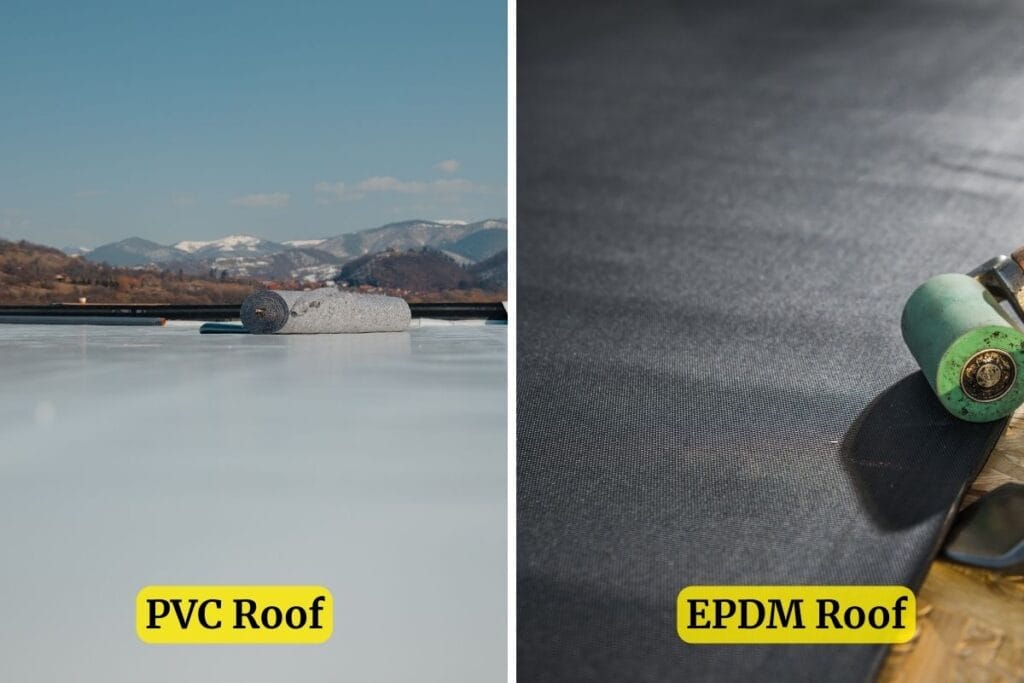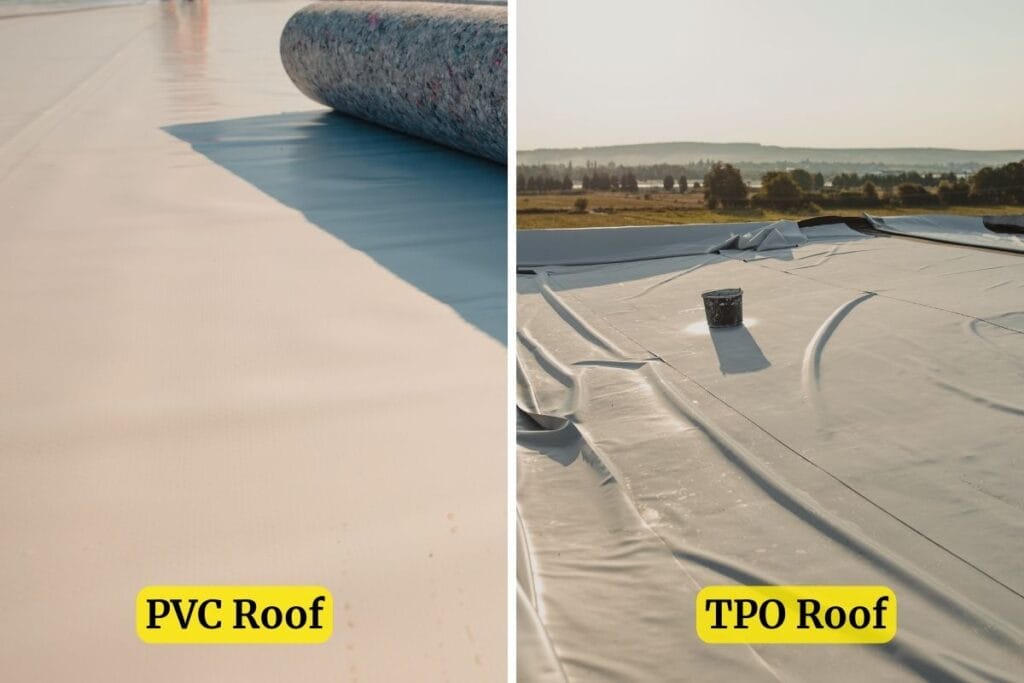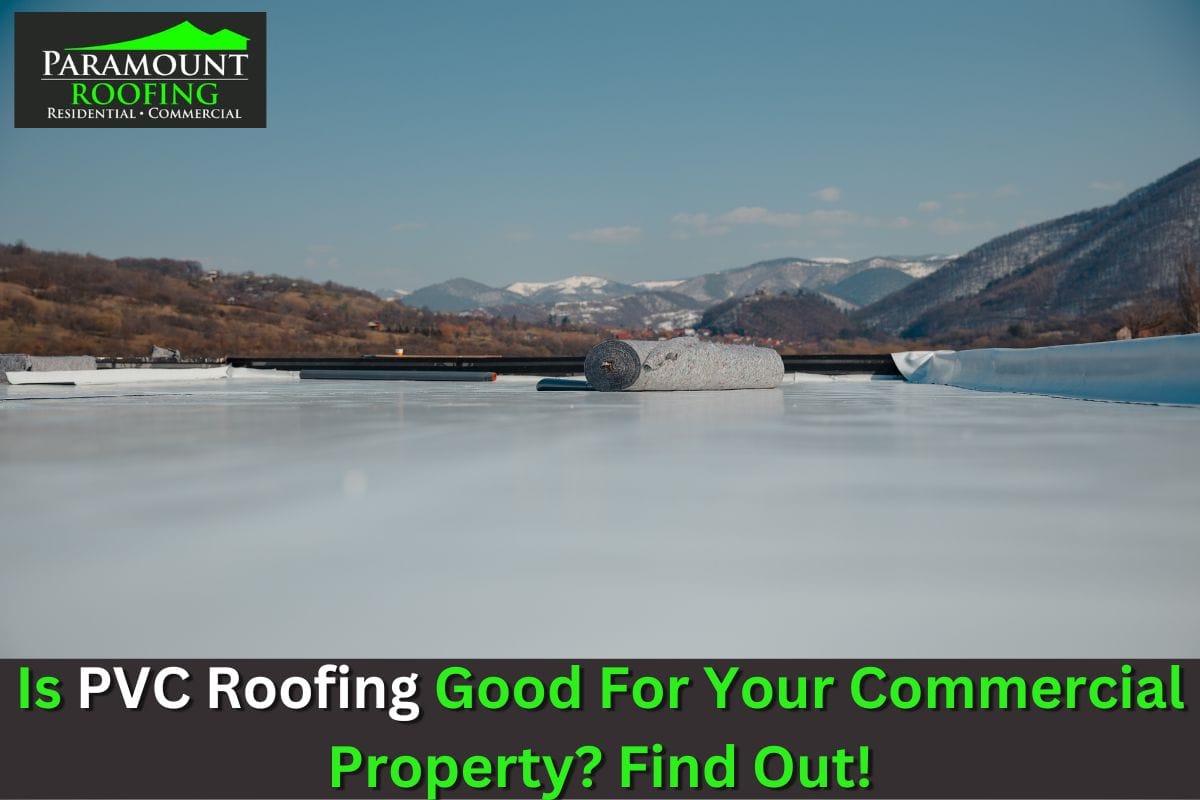Did you know that the chosen roofing material plays a big role in maintaining a building’s structural integrity, energy efficiency, and long-term savings? Regardless of whether you’re constructing a new building or considering upgrades to an existing one, the choice of roofing material is very important.
If you are comparing commercial roofing materials, this blog post will give you expert insights into PVC roofing membranes, a popular choice for flat and low slope commercial roofs. Let’s learn about PVC’s pros, cons, application methods, price, and more!
What Is A PVC Roof, And How Does It Work?
Polyvinyl Chloride, otherwise known as PVC, is utilized as a single-ply roofing solution for commercial properties where a flexible membrane made of PVC and reinforcing materials is installed as the top layer of the roofing system. It works as a flexible, waterproof membrane offering solid protection from moisture, pests, wind, impacts, and chemical damage.
The Advantages Of PVC Roofs For Commercial Properties
Here’s an in-depth look at how this roofing material can benefit your building:
Longevity
One major advantage of PVC rests in its durability. Withstanding at least two decades under various environmental stressors, this single-ply membrane lasts anywhere between 15 to 30 years.
Weather Resistance
When we think about what a roof must endure throughout the year, such as storms, intense sun exposure, and rain, we can appreciate the importance of having weather-resistant roofing material.
Below are just some of the attributes that make PVC roofs particularly resistant:
- Superior heat-welded seams result in leak-free roofs
- Fire resistance due to self-extinguishing capabilities
- High wind uplift resistance makes them ideal roofing solutions in windy regions.
Cost-Effectiveness
According to RoofCalc, the average cost to install a PVC membrane falls around $6.50 to $8 per square foot, based on the membrane’s quality and thickness. Make sure you are following a proper maintenance routine to maintain its long lifespan. Ignoring maintenance can leave you with expensive costs in repairs in replacement down the line.
However, PVC roofing membranes are meant to last with minimal intervention. With fewer replacement needs and reduced upkeep expenses, it can end up being a more economical option in the long run.
Energy Efficiency
White or light-colored PVC deflects sunlight rather than absorbing it like dark surfaces tend to do. This characteristic thereby diminishes the rate of heat transfer into a building, allowing for lower cooling costs during summer months, which is a clear win-win for the environment and your property’s energy bills.
The Drawbacks And Limitations Of A PVC Roofing System
Here’s an honest look at potential challenges you may encounter with a PVC roofing system, so you can make an informed decision regarding whether this roofing material is indeed well-suited for your property.
Maintenance Requirements
PVC’s durability is balanced by fairly regular roof maintenance needs, especially compared to some other types of roofing material. Cracks are among the main concerns when it comes to petroleum based products like PVC. Make sure your roof does not remain dirty or come in contact with incompatible materials.
Installation Challenges
As with any construction project involving technical expertise, installing a PVC system comes with its share of potential problems if handled improperly. One key aspect is ensuring seams are properly welded together during installation because ill-executed seams have been shown to cause leaks over time. A poorly repaired or maintained roof drain could also lead to water pooling on the roof’s surface which accelerates degradation.
Foot Traffic Limitations
Unlike gravel or built-up roofs (BUR), foot traffic limitations exist on a PVC membrane. Frequent or heavy foot traffic can lead to premature wear and tear of the surface, potentially decreasing its durability over time.
It’s important to note that this limitation is somewhat mitigated by the availability of walkway pads designed specifically to protect single-ply membranes if they receive frequent foot traffic. As always, engage a professional’s opinion before making a decision!
Debunking Common Misconceptions About PVC Roofs
In an attempt to provide a comprehensive understanding of PVC roofing systems, it’s important to debunk the common misconceptions surrounding this type of material. This clarification will empower you as a commercial property owner to make informed decisions about your roofing system.
Myth#1 PVC Membrane Roofs Are Inherently Fragile And Can’t Withstand Substantial Impacts
Significant advances have been made in the manufacture of PVC materials, which enhance the membrane’s strength and lifespan. Instead of viewing PVC roofing membranes as brittle or fragile, evidence shows that they are capable of absorbing shocks from dropped tools or debris while also enduring heavy wind pressure.
Myth#2 PVC Material Is Excessively Susceptible To Heat Damage
While it is true that all kinds of roofs come with some temperature sensitivity, modern PVC is designed to reduce these dangers significantly. Manufactured with cool-roof technology, they maintain lower surface temperatures even under intense sunlight, thus minimizing potential heat-induced damages.
Myth#3 PVC Roofs Fade Rapidly And Look Unattractive Soon After Installation
In reality, high-quality PVC membranes and error-free installation will maintain the membrane’s look for many years. Plus, with the UV inhibitors embedded during their manufacturing process, these roofs exhibit superior resistance against discoloration caused by sun exposure over time.
Myth#4 The Cost-Effectiveness Of A PVC Roofing System Is Questionable
Surprisingly enough, investing in durable PVC materials from a renowned manufacturer would mean far fewer repairs across its lifespan and solid warranty protection. This, combined with energy savings obtained from its superior insulation properties, makes PVC a cost-effective solution.
Now, let’s compare PVC to other commercial roofing materials.
PVC vs. EPDM Roofs

Between EPDM and PVC membranes, the longevity and resilience of each material become the differentiating factors. EPDM, known for its extended lifespan of 30 to 40 years, proves to be a better contender. It outlasts PVC, enduring the tests of time and weather conditions with enhanced durability. Its ability to withstand cold temperatures and hail impact is also notable, making it a reliable choice for regions prone to harsh weather.
On the flip side, PVC shows better resistance to different types of chemicals and a surface that reflects more heat. These attributes contribute to lower cooling costs during warmer months, showcasing PVC’s energy-efficient qualities.
Adding another layer to the comparison is the affordability factor. EPDM emerges as the more cost-effective option, making it an attractive choice for those looking to balance performance with budget considerations.
PVC vs. TPO Roofing Membranes

PVC and TPO find themselves at odds when it comes to environmental and budget considerations. Both PVC and TPO have inherent energy efficiency properties, which stem from their reflective surface, translating into lower cooling costs. This aligns seamlessly with long-term energy savings for your commercial property.
On the environmental front, TPO often presents itself as a more eco-friendly option than PVC. However, TPO roof installations can cost a little more than PVC. If immediate or long term cost considerations take priority, PVC might be more fitting for your building.
Before choosing any commercial roofing material, you must consider some important elements that play a part in the performance and durability of your roof.
Consider These Factors When Choosing A Commercial Roofing Material
Here are the major factors you should consider when choosing a commercial roofing material, whether it’s PVC or another option:
Building Structure and Design Considerations
The architectural layout of your building plays a monumental role in deciding whether PVC would be suitable or not. Flat roofs usually reap higher benefits because the membrane sheets can easily be stretched across their surface without any creases or folds. If your building has numerous HVAC units or other protrusions, then a flexible and smoothly adherable membrane like PVC can provide significant convenience during installation.
Climate Factors
Climate plays an undeniable part in determining how well your chosen roofing material will perform over time. Thankfully, what sets apart the durable nature of PVC is its superior ability to resist a broad range of weather conditions, including extreme heat and heavy rain. Keep in mind though that areas subjected to constant high foot traffic might place excess strain, weakening the protective layers of your precious roof.
Budget Considerations
Budgetary restrictions often dictate the direction and feasibility of any roofing or renovation plan. If you feel the initial cost of installation is high, you need to bear in mind that this investment can pay off in the long run due to its sturdiness and long term durability.
Understanding these considerations will better equip you to decide if a PVC roofing system is indeed the best choice for your commercial property. Always ensure adequate research and professional consultation before moving forward!
If you are looking for a commercial roofing material like PVC, TPO, or EPDM, we can help you select the best one for your building!
Schedule A Free Consultation For Commercial Roof Installation In Metro Detroit, MI
At Paramount Roofing, we install and maintain all types of commercial and flat roofs, including ones with PVC. Our certified team is renowned for their flawless roofing services and customer support. If you are looking for a new commercial roof in Metro Detroit, MI, we’re here to guide you through the process, start to finish. Call us at (586) 690-0227, and schedule a free consultation with one of our experts. We’ll answer all your questions and help you select the best roofing material for your commercial property.
 Free Estimate
Free Estimate
 Request Service
Request Service Locations
Locations 
